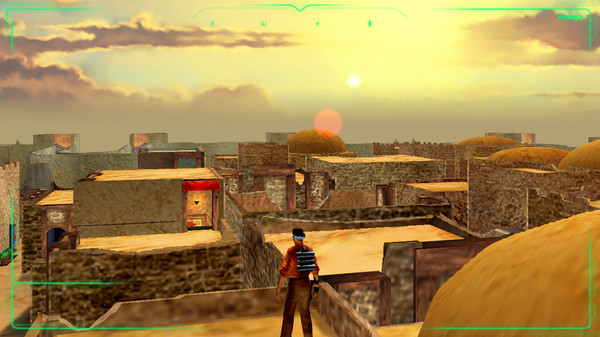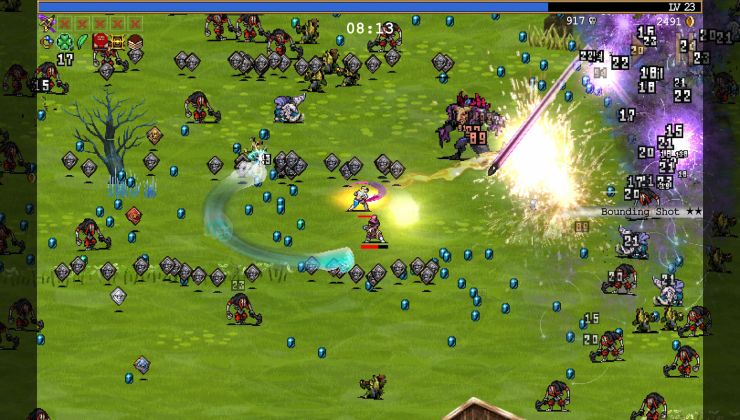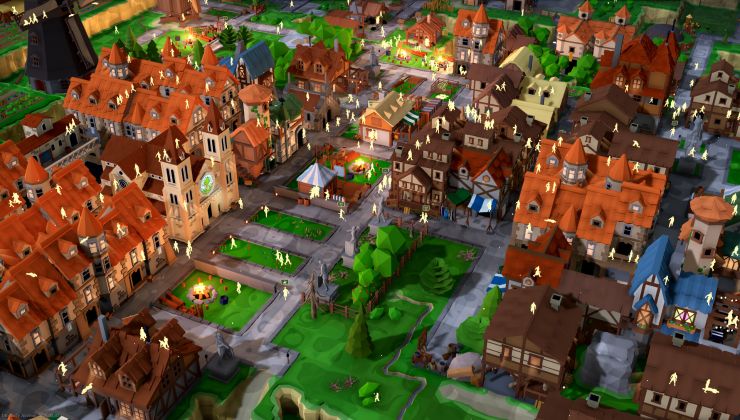
A revamp of the classic game Outcast named "Outcast 1.1" has been released, and the developers noted a Linux version is planned.
It's funny because I shot off an email to the developers earlier, and only after thought about checking their Steam forum where they said this:
QuoteIt is planned for a future update, but don't expect it to be really soon, sorry.
About the game
Outcast has been critically acclaimed to the point it has reach some cult status among many PC gamers.
About this version
Outcast 1.1 has been recompiled from the original source code and improved to run smoothly on today's computers. The main improvements compared to the original version are: multithreaded voxel renderer for higher performances, software bilinear filtering on polygonal meshes, part of the HUD redesigned to match higher resolutions, new high-resolution sky paintings, new launcher, native support of xbox gamepad, user-friendly controller configuration, a lot of bugs fixed and improved stability.
Story
In 2007, the U.S. government successfully sends a probe to an alien world in a parallel universe. As the probe is transmitting video images of the world, an alien life form discovers the probe and damages it, causing a disruptive backlash of energy to form a black hole threatening Earth. Former U.S. Navy SEAL Cutter Slade is given the job of escorting three scientists (William Kauffmann, Anthony Xue and Marion Wolfe) on a mission to this alien world to recover the probe and stop the threat. Arriving in this alien world, Cutter is separated from the other scientists and is hailed by the natives as their messiah, the Ulukai.
Some you may have missed, popular articles from the last month:
All posts need to follow our rules. For users logged in: please hit the Report Flag icon on any post that breaks the rules or contains illegal / harmful content. Guest readers can email us for any issues.
Great news! I've heard good things about the original game and have considered buying it to try running it in Wine, but I've never pulled the trigger.
1 Likes
I played it too, back in the day. As I recall, one thing unusual about the game was that it used OpenGL, rather than DirectX. In fact, I have wondered if it could be ported; this will be grand news.
If I remember correctly, it is sort of an Elder-Scrolls-in-space game. It would be great to play it again, and, if it looks better, lovely. I have grown a tiny bit tired of deliberately crude graphics (Full disclosure: I play Dominions 4, which has...adequate graphics) in lots and lots of indie games. In other words, bring on the better looking games! Not that graphics are essential, but they do add a nice sheen of professionalism.
If I remember correctly, it is sort of an Elder-Scrolls-in-space game. It would be great to play it again, and, if it looks better, lovely. I have grown a tiny bit tired of deliberately crude graphics (Full disclosure: I play Dominions 4, which has...adequate graphics) in lots and lots of indie games. In other words, bring on the better looking games! Not that graphics are essential, but they do add a nice sheen of professionalism.
0 Likes
As I recall, one thing unusual about the game was that it used OpenGL, rather than DirectX.
You recall wrong.
[Outcast](http://www.mobygames.com/game/windows/outcast) is one of those famous "voxel" games, like [Blade Runner](http://www.mobygames.com/game/windows/blade-runner). Contrary to modern games, it doesn't use vertices and faces as its basic geometry, but [voxels](https://en.wikipedia.org/wiki/Voxel), basically 3d pixels.
Think legos. Each 1x1 block (or 1x1 part of a bigger block) would be 1 voxel. They're each a single color. And a lot of them create a figure, like those [big figure in Legoland](http://www.kidsandparenting.com/kidsandp/images/feature/legoland-figure.jpg).
As such, the renderer in Outcast was completely software-based. It did not use OpenGL or DirectX or any other API for hardware-based rendering (because those all depend on vertices and faces).
---
On-topic: [The Outcast HD Reboot Kickstarter campaign](https://www.kickstarter.com/projects/outcast-reboot-hd/outcast-reboot-hd) failed earlier this year. Good to see they've still did it, sort of. But I wonder whether it's such a smart move: the failed campaign showed pretty clearly Outcast isn't such a huge nostalgia title after all...
1 Likes
Indeed, not everyone will buy it; but it's one of those REALLY overlooked games that so many passed on when it was released. Having this on Linux would be awesome.
0 Likes
Is it only me or there is something not right with the two sentences :
- A Linux version is planned
- Don't except it soon
They wish to have a Linux version but they don't have the money to do it and Linux will never be on the top list of priorities. So I wonder if this version works well on WINE ?
- A Linux version is planned
- Don't except it soon
They wish to have a Linux version but they don't have the money to do it and Linux will never be on the top list of priorities. So I wonder if this version works well on WINE ?
0 Likes
As I recall, one thing unusual about the game was that it used OpenGL, rather than DirectX.
You recall wrong.
[snip]
Yep, you're right; I had forgotten that the hype was about voxels, not anything else. Ah, me. My personal RAM is getting a little unreliable these days...
0 Likes
+ Click to view long quoteAs I recall, one thing unusual about the game was that it used OpenGL, rather than DirectX.
You recall wrong.
[Outcast](http://www.mobygames.com/game/windows/outcast) is one of those famous "voxel" games, like [Blade Runner](http://www.mobygames.com/game/windows/blade-runner). Contrary to modern games, it doesn't use vertices and faces as its basic geometry, but [voxels](https://en.wikipedia.org/wiki/Voxel), basically 3d pixels.
Think legos. Each 1x1 block (or 1x1 part of a bigger block) would be 1 voxel. They're each a single color. And a lot of them create a figure, like those [big figure in Legoland](http://www.kidsandparenting.com/kidsandp/images/feature/legoland-figure.jpg).
As such, the renderer in Outcast was completely software-based. It did not use OpenGL or DirectX or any other API for hardware-based rendering (because those all depend on vertices and faces).
---
As always Dr MCoy, a good technicall explanation illustrated with an easy to understand analogy saves the day. Now we can kick some klingon asses.
0 Likes









 How to set, change and reset your SteamOS / Steam Deck desktop sudo password
How to set, change and reset your SteamOS / Steam Deck desktop sudo password How to set up Decky Loader on Steam Deck / SteamOS for easy plugins
How to set up Decky Loader on Steam Deck / SteamOS for easy plugins
See more from me